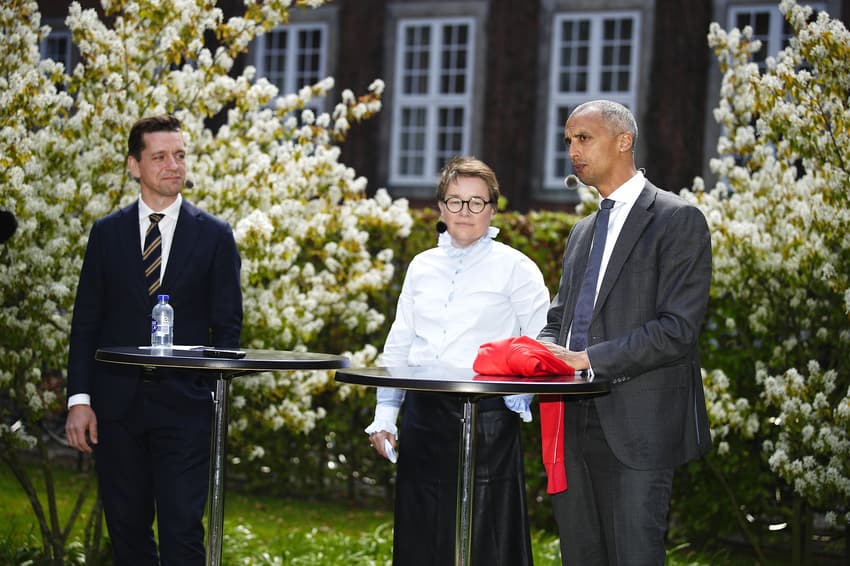Danish immigration minister Tesfaye switches jobs in government reshuffle

Minister for Immigration and Integration Mattias Tesfaye was on Monday named as the new Justice Minister in Denmark in a government reshuffle.
Three ministerial portfolios changed hands on Monday following the unexpected resignation on Sunday of the erstwhile Minister of Justice Nick Hækkerup.
In the headline move, Tesfaye was given Hækkerup’s job at the Ministry of Justice by Prime Minister Mette Frederiksen.
Kaare Dybvad Bek, who was Interior and Housing Minister, moves over to take Tesfaye’s job as immigration minister. Bek is meanwhile replaced at the housing ministry by political spokesperson Christian Rabjerg Madsen.
The movements following Hækkerup’s surpise announcement on Sunday that he was quitting his post at the Ministry of Justice, perhaps the most high-profile position in the Danish government after the Prime Minister, to become chairperson at the Danish Brewers’ Association (Bryggeriforeningen).
Tesfaye has occupied the post of immigration minister since 2019, when he took over from Inger Støjberg as government changed hands following the Social Democrats’ general election.
Despite coming from the opposite side of the political aisle to Støjberg, he sought to cultivate for himself his predecessor’s image as a hardliner against immigration and pursued strict policies on asylum and refugees.
READ ALSO: Minister praises ‘low’ number of Denmark asylum applications in 2021
He was at the forefront of Denmark’s pursuit of an offshore asylum centre in Rwanda, a plan criticised by the UN and rights groups, and was criticised at the EU parliament over Denmark’s policy of repatriating some of its Syrian refugees from the Damascus area.
His stance on asylum softened markedly following the Russian invasion of Ukraine as he pushed through a new law to assist displaced Ukrainians arriving in Denmark.
He faces a number of new challenges in his new job at the Ministry of Justice, including a high-profile case centred around leaks at intelligence service Forsvarets Efterretningstjeneste (FE), in which the former intelligence chief Lars Findsen and former defence minister Claus Hjort Frederiksen have both been accused of leaking sensitive information.
READ ALSO: Denmark frees ex-spy boss accused of leaks
Comments
See Also
Three ministerial portfolios changed hands on Monday following the unexpected resignation on Sunday of the erstwhile Minister of Justice Nick Hækkerup.
In the headline move, Tesfaye was given Hækkerup’s job at the Ministry of Justice by Prime Minister Mette Frederiksen.
Kaare Dybvad Bek, who was Interior and Housing Minister, moves over to take Tesfaye’s job as immigration minister. Bek is meanwhile replaced at the housing ministry by political spokesperson Christian Rabjerg Madsen.
The movements following Hækkerup’s surpise announcement on Sunday that he was quitting his post at the Ministry of Justice, perhaps the most high-profile position in the Danish government after the Prime Minister, to become chairperson at the Danish Brewers’ Association (Bryggeriforeningen).
Tesfaye has occupied the post of immigration minister since 2019, when he took over from Inger Støjberg as government changed hands following the Social Democrats’ general election.
Despite coming from the opposite side of the political aisle to Støjberg, he sought to cultivate for himself his predecessor’s image as a hardliner against immigration and pursued strict policies on asylum and refugees.
READ ALSO: Minister praises ‘low’ number of Denmark asylum applications in 2021
He was at the forefront of Denmark’s pursuit of an offshore asylum centre in Rwanda, a plan criticised by the UN and rights groups, and was criticised at the EU parliament over Denmark’s policy of repatriating some of its Syrian refugees from the Damascus area.
His stance on asylum softened markedly following the Russian invasion of Ukraine as he pushed through a new law to assist displaced Ukrainians arriving in Denmark.
He faces a number of new challenges in his new job at the Ministry of Justice, including a high-profile case centred around leaks at intelligence service Forsvarets Efterretningstjeneste (FE), in which the former intelligence chief Lars Findsen and former defence minister Claus Hjort Frederiksen have both been accused of leaking sensitive information.
READ ALSO: Denmark frees ex-spy boss accused of leaks
Join the conversation in our comments section below. Share your own views and experience and if you have a question or suggestion for our journalists then email us at [email protected].
Please keep comments civil, constructive and on topic – and make sure to read our terms of use before getting involved.
Please log in here to leave a comment.